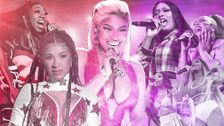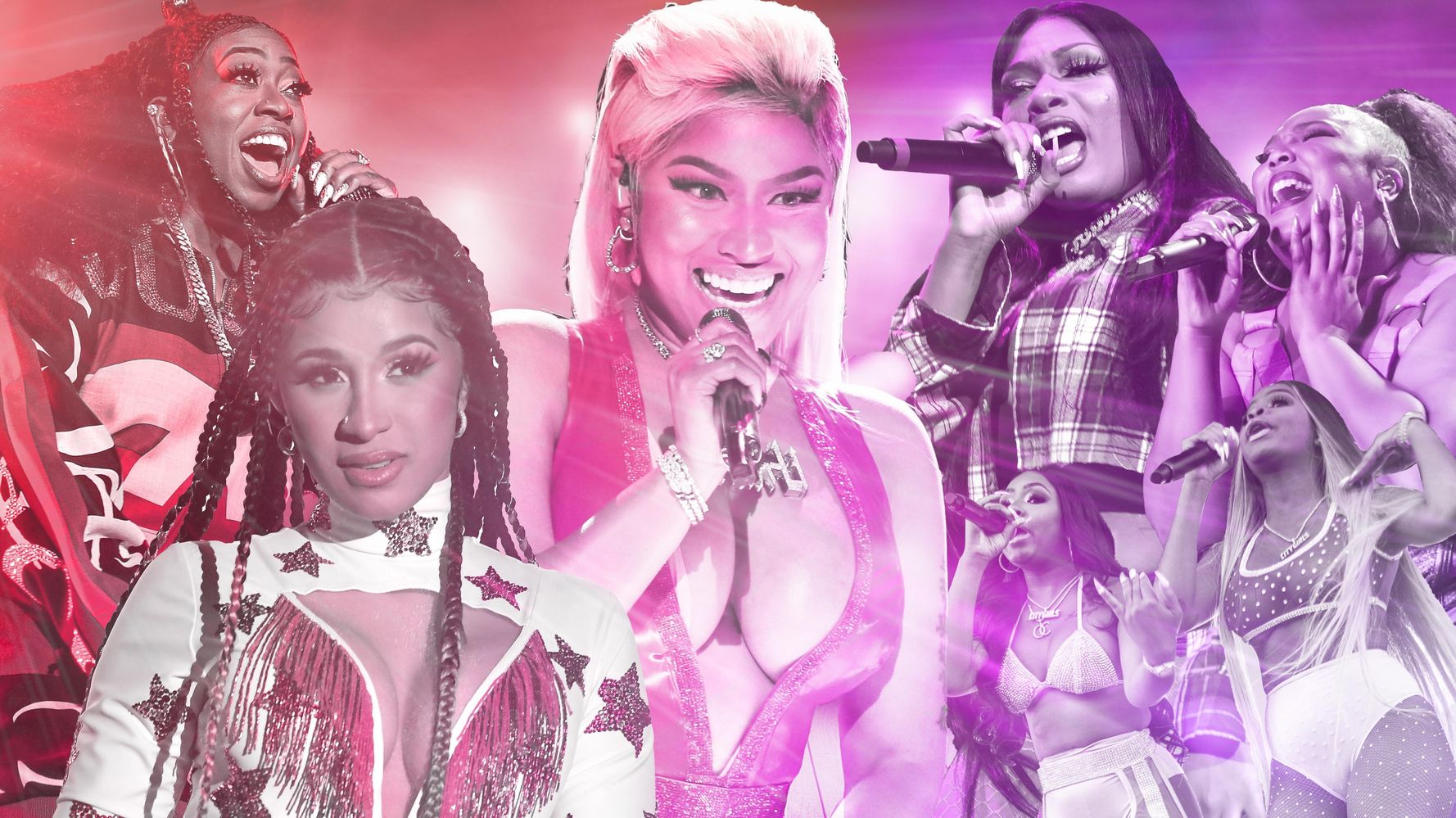[ad_1]

2019 is rich with rap collaborations — and women in hip-hop are leading the way. Finding the most success is Megan Thee Stallion and Nicki Minaj’s “Hot Girl Summer” featuring Ty Dolla Sign’s raspy melodies on the hook. The anthem — based on the Houston rapper’s mantra encouraging women to live their best lives — cleverly samples City Girls’ defiant banger “Act Up.”
“Hot Girl Summer” debuted at No. 11 on the Billboard Hot 100 earlier this month. Ahead of dropping the single, Megan Thee Stallion and Nicki Minaj teased a collaboration on Instagram Live, and received adoration from their lively fan bases. Nicki Minaj later shouted out their fans on Instagram in a caption promoting the record. “When the Barbies & the Hotties link up ? #HotGirlSummer ?,” she wrote.
At this point in music history, women rapping together is still considered a big deal, even though men teaming up for posse cuts across generational and regional backgrounds are a regular occurrence. Women in rap are still pushing back against the idea that only one lyricist can shine at a time. Just last summer, a beef between Nicki Minaj and Cardi B over their collab on Migos’ “MotorSport” fueled the idea that women are incapable of working together. But in the past decade, the lack of female rappers who have been marketed and supported in the mainstream music industry has been the main contributor to the lack of women-led linkups over rap beats. With the new wave of talented women in popular rap, fans want to see their favorites make music together. The newcomers and OGs are answering the call and churning out records with organic chemistry, ultimately disproving those preexisting catty stereotypes.
There have been so many rap collabs in the last year. Most recently, Saweetie brought along Jhené Aiko and City Girls for the remix of her Top 40 hit “My Type,” a rundown on the rich men she prefers. On Rapsody’s new album, “Eve,” she recruits Brooklyn rapper Leikeli47 for “Oprah,” to talk about money. There is City Girls’ hit “Twerk,” featuring Cardi B, a platinum single on the Miami duo’s 2018 “Girl Code.” The Miami bass heat-seeker on every Hot Girl Summer playlist peaked at No. 22 on the Billboard Hot 100 in February. The same month, Doja Cat and Rico Nasty joined forces for “Tia Tamera,” which borrows the names of the twin stars of the 1990s sitcom “Sister, Sister,” for an ode to loving their boobs. Rico Nasty spoke highly of working with Doja Cat to Genius.
“It’s important, not just for us as artists to be around that type of energy, I feel like it’s important for girls to see that, we can get along, no drama,” she said.
So many other hits have blasted over the airwaves like Dreezy’s “Chanel Slides” featuring Kash Doll, Lizzo’s “Tempo” featuring Missy Elliott and Trina’s “BAPS” featuring Nicki Minaj.
In the 1990s, women knew coming together in the rap game would be the most powerful way to make a statement on owning their femininity in a male-dominated space. On Queen Latifah’s “Ladies First” featuring Monie Love, released in 1989, the friends remind listeners that women, often underestimated and undervalued, possess an array of powers — whether it’s giving birth or laying down commanding verses.
“I chose to kind of take the route of uplifting women by trying to make some records that have some positive thoughts in it,” Queen Latifah said on HuffPost Live in 2015.
On Brandy’s 1994 “I Wanna Be Down (Remix)” featuring Queen Latifah, Yo-Yo and MC Lyte, the ladies shoot their best shot at their crushes.
“I was one of the first R&B artists to welcome hip-hop onto an R&B beat,” Brandy told Vibe in 2011. “It had never been done before quite like that. Sylvia Rhone came up with that idea, and I just thought it was brilliant.”
In 1996, Lil’ Kim’s “Not Tonight (Ladies Night Remix)” brought together Missy Elliott, Left Eye, Angie Martinez and Da Brat, who rapped about being untouchable women in full control of their business. The song reached No. 6 on the Billboard Hot 100.
“We loved the whole idea of lady empowerment,” Lil’ Kim told XXL Magazine in 2016. “I just wanted all my favorite artists on it. TLC, Missy, Da Brat.”
Fast-forward to this decade and we began to see a resurgence of female rap collabs. In 2014, Memphis legends Gangsta Boo and La Chat came together to release their EP, “Witch.” In 2017, Missy Elliott enlisted Eve, Lil’ Kim and Trina on her “I’m Better” remix. In 2018, R&B singer Kelela dropped off a remix of her song “LMK” featuring indie rappers Princess Nokia, Junglepussy, CupcakKe and Ms. Boogie. This month, Cardi B revealed to 92.3’s Big Boy, she wants to produce a super posse cut based on a Lil’ Kim song. “I want to put like four female rappers, and then I wanna put one female rapper that is not signed,” she shared.
The camaraderie between women in rap is reaching a new critical mass and is no longer a surprising feat. Just look at Megan Thee Stallion’s Instagram for evidence. The rapper has been rallying female artists for group photos and to “drive the boat,” her saying for pouring shots of cognac in their mouths. Women won’t and don’t always have to be friendly with each either, as rap has always been a competitive sport. But in a perfect future, this duality for women in hip-hop can finally be embraced as it has been for men in the rap game.
REAL LIFE. REAL NEWS. REAL VOICES.
Help us tell more of the stories that matter from voices that too often remain unheard.
[ad_2]
Source link

